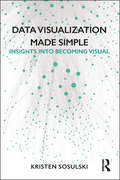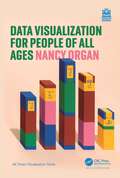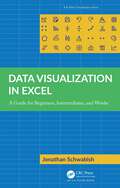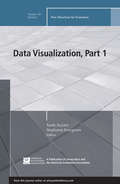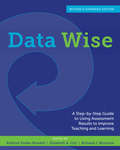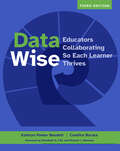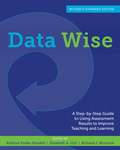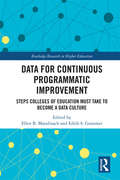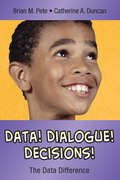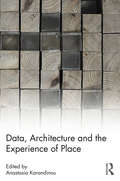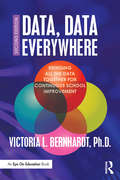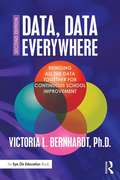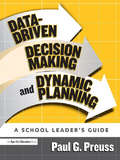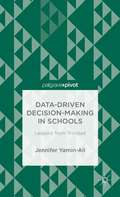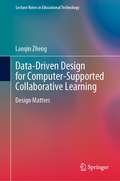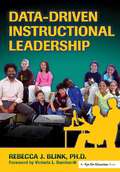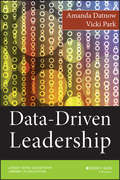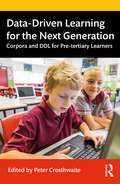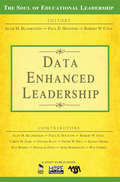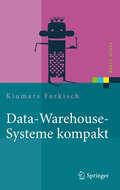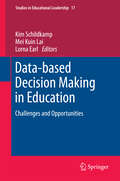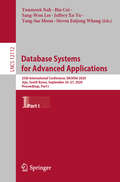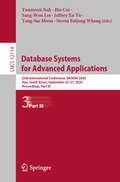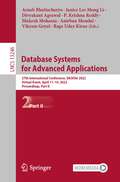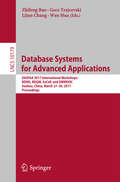- Table View
- List View
Data Visualization Made Simple: Insights into Becoming Visual
by Kristen SosulskiData Visualization Made Simple is a practical guide to the fundamentals, strategies, and real-world cases for data visualization, an essential skill required in today’s information-rich world. With foundations rooted in statistics, psychology, and computer science, data visualization offers practitioners in almost every field a coherent way to share findings from original research, big data, learning analytics, and more. In nine appealing chapters, the book: examines the role of data graphics in decision-making, sharing information, sparking discussions, and inspiring future research; scrutinizes data graphics, deliberates on the messages they convey, and looks at options for design visualization; and includes cases and interviews to provide a contemporary view of how data graphics are used by professionals across industries Both novices and seasoned designers in education, business, and other areas can use this book’s effective, linear process to develop data visualization literacy and promote exploratory, inquiry-based approaches to visualization problems.
Data Visualization for People of All Ages (ISSN)
by Nancy OrganData visualization is the art and science of making information visible. On paper and in our imaginations, it’s a language of shapes and colors that holds our best ideas and most important questions. As we find ourselves swimming in data of all kinds, visualization can help us to understand, express, and explore the richness of the world around us. No matter your age or background, this book opens the door to new ways of thinking and sharing through the power of data visualization.Data Visualization for People of All Ages is a field guide to visual literacy, born from the author’s personal experience working with world-class scholars, engineers, and scientists. By walking through the different ways of showing data—including color, angle, position, and length—you’ll learn how charts and graphs truly work so that no visualization is ever a mystery or out of reach. It doesn’t stop at what fits on a page, either. You’ll journey into cutting-edge topics like data sonification and data physicalization, using sound and touch to share data across the different senses. Packed with practical examples and exercises to help you connect the dots, this book will teach you how to create and understand data visualizations on your own—all without writing a single line of code or getting tangled up in software.Written with accessibility in mind, this book invites everyone to the table to share the joy of one of today’s most necessary skills. Perfect for home or classroom use, this friendly companion gives people of all ages everything they need to start visualizing with confidence.
Data Visualization in Excel: A Guide for Beginners, Intermediates, and Wonks (AK Peters Visualization Series)
by Jonathan SchwabishThis book closes the gap between what people think Excel can do and what they can achieve in the tool. Over the past few years, recognition of the importance of effectively visualizing data has led to an explosion of data analysis and visualization software tools. But for many people, Microsoft Excel continues to be the workhorse for their data visualization needs, not to mention the only tool that many data workers have access to. Although Excel is not a specialist data visualization platform, it does have strong capabilities. The default chart types do not need to be the limit of the tool’s data visualization capabilities, and users can extend its features by understanding some key elements and strategies. Data Visualization in Excel provides a step-by-step guide to creating more advanced and often more effective data visualizations in Excel and is the perfect guide for anyone who wants to create better, more effective, and more engaging data visualizations.
Data Visualization, Part 1: New Directions for Evaluation, Number 139 (J-B PE Single Issue (Program) Evaluation)
by Stephanie Evergreen Tarek AzzamDo you communicate data and information to stakeholders? This issue is Part 1 of a two-part series on data visualization and evaluation. In Part 1, we introduce recent developments in the quantitative and qualitative data visualization field and provide a historical perspective on data visualization, its potential role in evaluation practice, and future directions. It discusses: Quantitative visualization methods such as tree maps Sparklines Web-based interactive visualization Different types of qualitative data visualizations, alongwith examples in various evaluation contexts A toolography describing additional data visualization toolsand software, along with their major strengths and limitations. Intended as a guidance for understanding and designing data visualizations, this issue introduces fundamental concepts and links them to daily practice.This is the 139th volume of the Jossey-Bass quarterly report series New Directions for Evaluation, an official publication of the American Evaluation Association.
Data Wise, Revised and Expanded Edition: A Step-by-Step Guide to Using Assessment Results to Improve Teaching and Learning
by Kathryn Parker BoudettData Wise, Third Edition (9781682539972) is now available! The new edition isn't just an update—it's an equity transformation that makes Data Wise clearer, more inclusive, and applicable beyond K-12 to support whole-child learning. ***Data Wise, Revised and Expanded Edition presents a continuous, sustainable process that allows school leaders to harness classroom metrics to inform educational practice.At its core, the Data Wise method fosters effective collaboration among educators, enabling teams to study a wide range of evidence and then use what they learn to enrich school culture and climate and ensure that each student thrives.Kathryn Parker Boudett, Elizabeth A. City, and Richard J. Murnane offer clear guidance for enacting all stages of the Data Wise improvement process and for integrating data inquiry into long-term institutional practice. They begin with actions that lay the groundwork for collaboration: advancing assessment literacy among contributors, building productive professional learning communities, and identifying targets for change. They continue with advice on evaluating progress and boosting accountability.Throughout the book, the authors recommend practical tools and proven practices, such as the plus/delta protocol and the ACE Habits of Mind (focusing on action, collaboration, and evidence), that help school leaders optimize the quality of meetings, especially those in which educators analyze data. They also provide tips for how to make best use of developments in education and technology, from Common Core State Standards to online collaboration tools.The field-tested strategies of the Data Wise improvement process have been used to great success in schools around the world, showing that careful examination of test scores, classroom data, and other educational evaluations can become a catalyst for important schoolwide conversations and transformations.
Data Wise, Third Edition: Educators Collaborating So Each Learner Thrives
by Kathryn Parker Boudett Candice BocalaA revised and updated edition presents field-tested strategies to foster equity, inclusion, and continuous improvement in educational practice
Data Wise: A Step-By-Step Guide to Using Assessment Results to Improve Teaching and Learning
by Richard J. Murnane Kathryn Parker Boudett Elizabeth A. CityData Wise: A Step-by-Step Guide to Using Assessment Results to Improve Teaching and Learning presents a clear and carefully tested blueprint for school leaders. It shows how examining test scores and other classroom data can become a catalyst for important schoolwide conversations that will enhance schools' abilities to capture teachers' knowledge, foster collaboration, identify obstacles to change, and enhance school culture and climate. This revised and expanded edition captures the learning that has emerged in integrating the Data Wise process into school practice and brings the book up-to-date with recent developments in education and technology including: The shift to the Common Core State Standards. New material on the "ACE Habits of Mind": practices that prioritize Action, Collaboration, and Evidence as part of transforming school culture. A new chapter on "How We Improve," based on experiences implementing Data Wise and to address two common questions: "Where do I start?" and "How long will it take?" Other revisions take into account changes in the roles of school data teams and instructional leadership teams in guiding the inquiry process. The authors have also updated exhibits, examples, and terminology throughout and have added new protocols and resources.
Data for Continuous Programmatic Improvement: Steps Colleges of Education Must Take to Become a Data Culture (Routledge Research in Higher Education)
by Ellen B. Mandinach Edith GummerThis book addresses the issue of data use in educator preparation programs towards continuous programmatic improvement. With an aim to increase the rigor in both research and practice in educational administration and teacher education, this volume will analyze the longstanding quality concerns about teacher and leadership preparation and standards for programs and educators, as well as controversies concerning national accreditation and federal efforts to mandate program reporting data. By exploring the policies and practices that influence departments of education, this volume examines the increasing pressures to improve institutional functioning, within a complex system of university, state, and national structures and organizations.
Data! Dialogue! Decisions!: The Data Difference
by Brian M. Pete Catherine A. DuncanLink relevant data to results instantly and consistently!This powerful text offers school leaders a process for data-based decision making that includes the critical elements of school improvement: collaborative teams, meaningful data, and measurable results. Administrators and instructors select the data, dialogue about the findings, and then make informed decisions about improving student performance. Educators will learn to:Select data that is easily accessible, collectible on an ongoing basis, and capable of impacting student achievementUse the three-step cyclical model of data analysisCreate and assess goals that are specific, measurable, and results-oriented
Data, Architecture and the Experience of Place
by Anastasia KarandinouThe notion of data is increasingly encountered in spatial, creative and cultural studies. Big data and artificial intelligence are significantly influencing a number of disciplines. Processes, methods and vocabularies from sciences, architecture, arts are borrowed, discussed and tweaked, and new cross-disciplinary fields emerge. More and more, artists and designers are drawing on hard data to interpret the world and to create meaningful, sensuous environments. Architects are using neurophysiological data to improve their understanding of people’s experiences in built spaces. Different disciplines collaborate with scientists to visualise data in different and creative ways, revealing new connections, interpretations and readings. This often demonstrates a genuine desire to comprehend human behaviour and experience and to – possibly – inform design processes accordingly. At the same time, this opens up questions as to why this desire and curiosity is emerging now, how it relates to recent technological advances and how it converses with the cultural, philosophical and methodological context of the disciplines with which it engages. Questions are also raised as to how the use of data and data-informed methods may serve, support, promote and/or challenge political agendas. Data, Architecture and the Experience of Place provides an overview of new approaches on this significant subject and is ideal for students and researchers in digital architecture, architectural theory, design, digital media, sensory studies and related fields.
Data, Data Everywhere: Bringing All the Data Together for Continuous School Improvement
by Victoria L. BernhardtThe latest book from best-selling author Victoria L. Bernhardt is an easy-to-read primer that describes what it takes to achieve student learning growth at every grade level, in every subject area, and with every student group. In this new edition, readers will learn how to use data to inform their continuous school improvement as they develop an appreciation of the various types of data, uses for data, and how data are involved in the process. This accessible, updated edition provides a wealth of straightforward and accessible strategies that will allow educators to become comfortable with the many uses of data in increasing student improvement. Data, Data Everywhere, 2nd edition, provides a framework and summary of the continuous school improvement framework. It is a perfect resource for teachers, administrators, support staff, and students of leadership to guide comprehensive school improvement that will make a difference for all students.
Data, Data, Everywhere: Bringing All the Data Together for Continuous School Improvement
by Victoria L. Bernhardt<p>The latest book from best-selling author Victoria L. Bernhardt is an easy-to-read primer that describes what it takes to achieve student learning growth at every grade level, in every subject area, and with every student group. In this new edition, readers will learn how to use data to inform their continuous school improvement as they develop an appreciation of the various types of data, uses for data, and how data are involved in the process. This accessible, updated edition provides a wealth of straightforward and accessible strategies that will allow educators to become comfortable with the many uses of data in increasing student improvement. <p>Data, Data Everywhere, 2nd edition, provides a framework and summary of the continuous school improvement framework. It is a perfect resource for teachers, administrators, support staff, and students of leadership to guide comprehensive school improvement that will make a difference for all students.</p>
Data-Driven Decision Making and Dynamic Planning: A School Leader's Guide
by Paul PreussThis book will help you understand how to integrate data-based decisions into the daily work of the school. It is a practical and relevant handbook for converting data into wise decision-making and planning. It will give you the skills to successfully make data-based decisions, measure student learning and program effectiveness, evaluate student progress, use data to improve instruction, integrate a "Dynamic Planning" process into the daily operation of your school.
Data-Driven Decision-Making in Schools: Lessons from Trinidad
by Jennifer Yamin-AliYamin-Ali shows how schools can undertake responsible decision-making through gathering and evaluating data, using as examples six fully developed case studies that shed light on common questions of school culture and student life, including student stress, subject selection, and the role of single-sex classes.
Data-Driven Design for Computer-Supported Collaborative Learning: Design Matters (Lecture Notes in Educational Technology)
by Lanqin ZhengThis book highlights the importance of design in computer-supported collaborative learning (CSCL) by proposing data-driven design and assessment. It addresses data-driven design, which focuses on the processing of data and on improving design quality based on analysis results, in three main sections. The first section explains how to design collaborative learning activities based on data-driven design approaches, while the second shares illustrative examples of computer-supported collaborative learning activities. In turn, the third and last section demonstrates how to evaluate design quality and the fidelity of enactment based on design-centered research.The book features several examples of innovative data-driven design approaches to optimizing collaborative learning activities; highlights innovative CSCL activities in authentic learning environments; demonstrates how learning analytics can be used to optimize CSCL design; and discusses the design-centered research approach to evaluating the alignment between design and enactment in CSCL. Given its scope, it will be of interest to a broad readership including researchers, educators, practitioners, and students in the field of collaborative learning, as well as the rapidly growing community of people who are interested in optimizing learning performance with CSCL.
Data-Driven Instructional Leadership
by Rebecca J. BlinkWith real-world examples from actual schools, this book shows you how to nurture a culture of continuous improvement, meet the needs of individual students, foster an environment of high expectations, and meet the requirements of NCLB.
Data-Driven Leadership
by Amanda Datnow Vicki ParkTools and techniques from the trailblazers in data-based education reformOver a period of several years, Amanda Datnow and Vicki Park visited public schools with a reputation for being ahead of the pack in data-driven decision making. The results of this pioneering study reveal how education leaders can make data work for students and teachers, rather than against them.This book is an essential guide to meeting the challenges of high-stakes accountability, building performance-based schools, and improving student outcomes. By following the advice in this book, you'll be able to transform data overload into a data-positive school culture. You'll learn the difference between "data-driven leadership" and "data-informed leadership," and how to use distributed leadership to inspire collaboration and guided analysis.Incorporating narrative reflections drawn from real educators and administrators, the authors refine their observations and interviews into practical conclusions that leaders can put to use immediately. This book empowers leaders to support inquiry, build trust in data-based initiatives, establish goals for evidence use, and provide educators with the skills they need to mobilize data for the good of all stakeholders."Datnow and Park's ideas are easily accessible and grounded in clear examples, and their seven 'calls' about what needs to be done nail the problem and the solutions. Use this book as your action guide and you'll be rewarded with better results in student learning."--Michael Fullan, professor emeritus, University of Toronto"Datnow and Park uncover, at last, what it means to use data to inform leadership. Documenting the four P's (people, policies, practices, and patterns) in schools, we learn about the organization and dynamics of reform informed by data. A must read!"--Ann Lieberman, senior scholar, Stanford University
Data-Driven Learning for the Next Generation: Corpora and DDL for Pre-tertiary Learners
by Peter CrosthwaiteDespite advancements in and availability of corpus software in language classrooms facilitating data-driven learning (DDL), the use of such methods with pre-tertiary learners remains rare. This book specifically explores the affordances of DDL for younger learners, testing its viability with teachers and students at the primary and secondary years of schooling. It features eminent and up-and-coming researchers from Europe, Asia, and Australasia who seek to address best practice in implementing DDL with younger learners, while providing a wealth of empirical findings and practical DDL activities ready for use in the pre-tertiary classroom. Divided into three parts, the volume's first section focuses on overcoming emerging challenges for DDL with younger learners, including where and how DDL can be integrated into pre-tertiary curricula, as well as potential barriers to this integration. It then considers new, cutting-edge innovations in corpora and corpus software for use with younger learners in the second section, before reporting on actual DDL studies performed with younger learners (and/or their teachers) at the primary and secondary levels of education. This book will appeal to post-graduate students, academics and researchers with interests in corpus linguistics, second language acquisition, primary and secondary literacy education, and language and educational technologies.
Data-Enhanced Leadership
by Alan M. Blankstein Paul D. Houston Robert W. ColeThis compact volume combines research, practice, and innovative thinking to illustrate how strategic application of data enhances leadership practices and significantly improves curriculum, instruction, and schoolwide performance.
Data-Warehouse-Systeme kompakt: Aufbau, Architektur, Grundfunktionen (Xpert.press)
by Kiumars FarkischIn dem Buch werden Data-Warehouse-Systeme als einheitliche, zentrale, vollständige, historisierte und analytische IT-Plattform untersucht und ihre Rolle für die Datenanalyse und für Entscheidungsfindungsprozesse dargestellt. Dabei behandelt der Autor die einzelnen Komponenten, die für den Aufbau, die Architektur und den Betrieb eines Data-Warehouse-Systems von Bedeutung sind. Die multidimensionale Datenmodellierung, der ETL-Prozess und Analysemethoden werden erörtert und Maßnahmen zur Performancesteigerung von Data-Warehouse-Systemen diskutiert.
Data-based Decision Making in Education: Challenges and Opportunities (Studies in Educational Leadership #17)
by Mei Kuin Lai Lorna Earl Kim SchildkampIn a context where schools are held more and more accountable for the education they provide, data-based decision making has become increasingly important. This book brings together scholars from several countries to examine data-based decision making. Data-based decision making in this book refers to making decisions based on a broad range of evidence, such as scores on students' assessments, classroom observations etc. This book supports policy-makers, people working with schools, researchers and school leaders and teachers in the use of data, by bringing together the current research conducted on data use across multiple countries into a single volume. Some of these studies are 'best practice' studies, where effective data use has led to improvements in student learning. Others provide insight into challenges in both policy and practice environments. Each of them draws on research and literature in the field.
Database Systems for Advanced Applications: 25th International Conference, DASFAA 2020, Jeju, South Korea, September 24–27, 2020, Proceedings, Part I (Lecture Notes in Computer Science #12112)
by Bin Cui Yang-Sae Moon Jeffrey Xu Yu Yunmook Nah Sang-Won Lee Steven Euijong WhangThe 4 volume set LNCS 12112-12114 constitutes the papers of the 25th International Conference on Database Systems for Advanced Applications which will be held online in September 2020. The 119 full papers presented together with 19 short papers plus 15 demo papers and 4 industrial papers in this volume were carefully reviewed and selected from a total of 487 submissions. The conference program presents the state-of-the-art R&D activities in database systems and their applications. It provides a forum for technical presentations and discussions among database researchers, developers and users from academia, business and industry.
Database Systems for Advanced Applications: 25th International Conference, DASFAA 2020, Jeju, South Korea, September 24–27, 2020, Proceedings, Part III (Lecture Notes in Computer Science #12114)
by Bin Cui Yang-Sae Moon Jeffrey Xu Yu Yunmook Nah Sang-Won Lee Steven Euijong WhangThe 4 volume set LNCS 12112-12114 constitutes the papers of the 25th International Conference on Database Systems for Advanced Applications which will be held online in September 2020. The 119 full papers presented together with 19 short papers plus 15 demo papers and 4 industrial papers in this volume were carefully reviewed and selected from a total of 487 submissions. The conference program presents the state-of-the-art R&D activities in database systems and their applications. It provides a forum for technical presentations and discussions among database researchers, developers and users from academia, business and industry.
Database Systems for Advanced Applications: 27th International Conference, DASFAA 2022, Virtual Event, April 11–14, 2022, Proceedings, Part II (Lecture Notes in Computer Science #13246)
by Mukesh Mohania P. Krishna Reddy Anirban Mondal Arnab Bhattacharya Vikram Goyal Janice Lee Mong Li Divyakant Agrawal Rage Uday KiranThe three-volume set LNCS 13245, 13246 and 13247 constitutes the proceedings of the 26th International Conference on Database Systems for Advanced Applications, DASFAA 2022, held online, in April 2021. The total of 72 full papers, along with 76 short papers, are presented in this three-volume set was carefully reviewed and selected from 543 submissions. Additionally, 13 industrial papers, 9 demo papers and 2 PhD consortium papers are included. The conference was planned to take place in Hyderabad, India, but it was held virtually due to the COVID-19 pandemic.
Database Systems for Advanced Applications: DASFAA 2017 International Workshops: BDMS, BDQM, SeCoP, and DMMOOC, Suzhou, China, March 27-30, 2017, Proceedings (Lecture Notes in Computer Science #10179)
by Wen Hua Lijun Chang Zhifeng Bao Goce TrajcevskiThis two volume set LNCS 10177 and 10178 constitutes the refereed proceedings of the 22nd International Conference on Database Systems for Advanced Applications, DASFAA 2017, held in Suzhou, China, in March 2017. The 73 full papers, 9 industry papers, 4 demo papers and 3 tutorials were carefully selected from a total of 300 submissions. The papers are organized around the following topics: semantic web and knowledge management; indexing and distributed systems; network embedding; trajectory and time series data processing; data mining; query processing and optimization; text mining; recommendation; security, privacy, senor and cloud; social network analytics; map matching and spatial keywords; query processing and optimization; search and information retrieval; string and sequence processing; stream date processing; graph and network data processing; spatial databases; real time data processing; big data; social networks and graphs.
